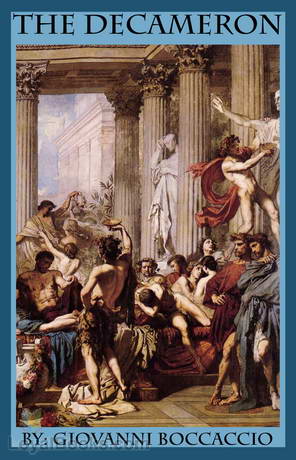
Giovanni Boccaccio’s The Decameron is a collection of novellas or short novels written during the 14th century. There are 100 tales contained in the book which is presented together. The book’s title The Decameron combines the two Greek words “deka” meaning ten and “hemera” meaning day. The title can be literally translated as “ten day,” which is also the time frame in which the stories are told by the 7 young women and 3 young men.
In the book, each of the ten persons took their turns to tell stories for a day. They did this during their stay at a villa in Fiesole in which they stayed to be safe from the Black Plague. The stories they told vary from love stories, narratives which have tragic endings to erotic tales. This book was originally written in vernacular Florentine and was subsequently translated into many different languages including English. Wayne Reborn’s recent translation of the book into English in 2013 was praised by many critics for being “modern” and it made the book more “readable” to younger audiences.
Like most of the literature from the medieval times, this book is full of symbolisms. The book’s subtitle “Prince Galehaut” is an allusion to Galehaut, a character in the tale of King Arthur who made a way for his friend Lancelot and Guinevere to meet and express their love for each other. It was believed that Boccaccio used this subtitle to express his sentiment about women during his time who have no social liberty and can’t freely express themselves. The seven young women in the book are believed to symbolize the four cardinal virtues and the three theological virtues while the three young men represent the classical belief of the Greeks in which the human soul has three parts: reason, spirit and appetite.
In the passage of time, other authors eventually borrowed the storylines of the tales told in the book. Modern readers may be amused to learn that the plots of some of the stories they know today were just borrowed from this The Decameron.

Other Audiobook
Audiobook: Insect Folk
Through delightful outings with her students, a teacher introduces her class to the fascinating world
Audiobook: Blood of the Vampire
The Blood of the Vampire is a Gothic novel, often compared to Bram Stoker’s Dracula
Audiobook: The Wolf Hunters
Follow Roderick and his friends Wabi and Mukoki on their adventures in the pristine North.
Audiobook: Christmas Carol Collection 2020
LibriVox volunteers bring you a festive selection of 23 Christmas carols for the 2020 holiday.
Audiobook: Dove in the Eagle’s Nest
Christina is an ordinary girl who lives with her aunt and uncle. Life is normal
Audiobook: Spontaneous Activity in Education
Maria Montessori saw that children gained a sense of satisfaction through doing work of their
Audiobook: Силуэты русских писателей, Выпуск 1
Бесконечно преданный русской литературе, Юлий Айхенвальд видел писателя как уникальную личность и не признавал литературных
Audiobook: My Inventions and Other Works
Between February and October 1919, Nikola Tesla submitted many articles to the magazine Electrical Experimenter.
Audiobook: Hero Tales from American History (version 2)
The purpose of this book “is to tell in simple fashion the story of some
Audiobook: Tom Sawyer Abroad by Huck Finn
Tom Sawyer Abroad is a novel by Mark Twain published in 1894. It features Tom
Audiobook: A History of the Philippines
This book is one of the earliest studies of Philippine history by an American scholar.
Audiobook: Diccionario Filosófico del Amor y las Mujeres
El presente libro es un diccionario que tiene como finalidad enseñar a los varones a